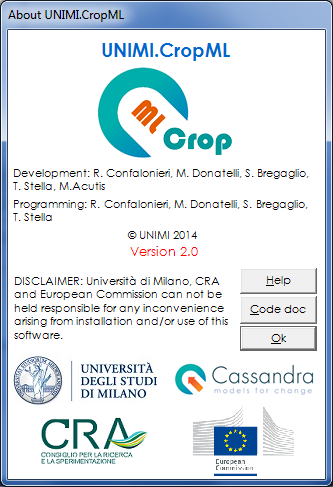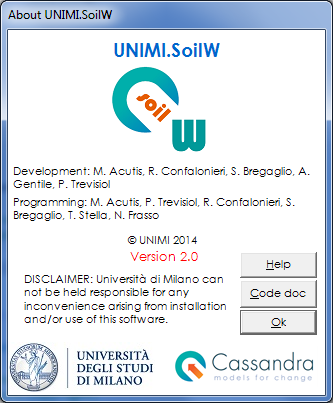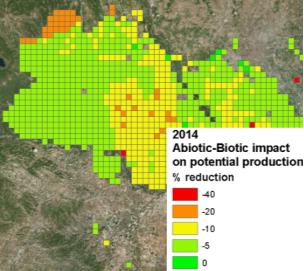New multi-model approach gives good estimations of wheat yield under semi-arid climate in Morocco.
 |
2015 - Agronomy for Sustainable Development, 35, 157-167 |
 |
Bregaglio, S., Frasso, N., Pagani, V., Stella, T., Francone, C., Cappelli, G., Acutis, M., Balaghi, R., Ouabbou, H., Paleari, L., Confalonieri, R. |
Abstract:
Wheat production in Morocco is crucial for economy and food security. However, wheat production is difficult because the semi-arid climate causes very variable wheat yields. To solve this issue, we need better prediction of the impact of drought on wheat yields to adapt cropping management to the semi-arid climate. Here, we adapted the models WOFOST and CropSyst to agro-climatic conditions in Morocco.
Six soft and durum wheat varieties were grown during the 2011–2012 and 2012–2013 growing seasons in the experimental
sites of Sidi El Aydi, Khemis Zemamra and Marchouch. Drip irrigation and rainfed treatments were arranged in a randomised-block design with three replicates. We determined the phenological stages of emergence, tillering, stem elongation, flowering and maturity.We measured boveground biomass six times along the season. These data were used to adaptWOFOSTand CropSyst to local conditions. Our results show that both models achieved good estimations, with R2 always higher than 0.91, and positive values for Nash and Sutcliffe modelling efficiencies. Results of spatially distributed simulations were then analysed for the whole country in terms of different response to drought.
Six soft and durum wheat varieties were grown during the 2011–2012 and 2012–2013 growing seasons in the experimental
sites of Sidi El Aydi, Khemis Zemamra and Marchouch. Drip irrigation and rainfed treatments were arranged in a randomised-block design with three replicates. We determined the phenological stages of emergence, tillering, stem elongation, flowering and maturity.We measured boveground biomass six times along the season. These data were used to adaptWOFOSTand CropSyst to local conditions. Our results show that both models achieved good estimations, with R2 always higher than 0.91, and positive values for Nash and Sutcliffe modelling efficiencies. Results of spatially distributed simulations were then analysed for the whole country in terms of different response to drought.
 |
Keywords: Food security, drought, water stress, crop monitoring, WOFOST, CropSyst |
 |
DOI: 10.1007/s13593-014-0225-6 |
- Comparison of three calibration methods for modeling rice phenology
- A simple pipeline for the assessment of legacy soil datasets: An example and test with soil organic carbon from a highly variable area.
- A high-resolution, integrated system for rice yield forecasting at district level.
- Downscaling rice yield simulation at sub-field scale using remotely sensed LAI data.
- Analysis and modelling of processes involved with salt tolerance and rice.
- Estimating crop nutritional status using smart apps to support nitrogen fertilization. A case study on paddy rice.
- Development of generic crop models for simulation of multi-species plant communities in mown grasslands.
- Quantifying uncertainty due to stochastic weather generators in climate change impact studies
- Predicting rice blast disease: machine learning versus process-based models
- Boundaries and perspectives from a multi-model study on rice grain quality in Northern Italy.








